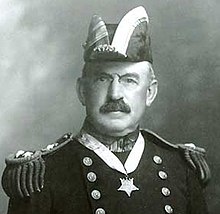Frank Friday Fletcher
Frank Friday Fletcher (born November 23, 1855 in Oskaloosa , Iowa , † November 28, 1928 in New York City ) was an American admiral and the uncle of Admiral Frank Jack Fletcher .
Life
Fletcher graduated from the United States Naval Academy in 1875. He spent the next few years as an officer on various ships in the US Navy , in 1887 he was assigned to the Bureau of Ordnance , where he was involved in the further development of various weapons and designed tactics for the use of torpedo boats . In 1896 he was deployed on the USS Maine , but was not on board during the severe explosion in Havana harbor . In 1911 he was promoted to Rear Admiral and became division commander in the US Atlantic Fleet . In 1913 he became Commander in Chief of the US fleet in the Gulf of Mexico .
When the Mexican authorities arrested the crew of an American torpedo boat in Veracruz in April 1914 and refused an extradition and an official apology, Fletcher received an order from US President Woodrow Wilson to occupy the city and liberate the soldiers. On April 22nd, the city was finally occupied and the sailors could be freed. Fletcher later received the Medal of Honor for his commitment . In September 1914 he was appointed commander of the Atlantic Fleet and promoted to admiral in 1915. In 1916 he was transferred ashore and became a member of several armaments and naval staffs.
In November 1919, Fletcher retired. He died in New York on November 28, 1928. He is buried in Arlington National Cemetery with his wife. The destroyer USS Fletcher , lead ship of the Fletcher class , was named after him.
Web links
| personal data | |
|---|---|
| SURNAME | Fletcher, Frank Friday |
| BRIEF DESCRIPTION | United States Navy Admiral in World War I. |
| DATE OF BIRTH | November 23, 1855 |
| PLACE OF BIRTH | Oskaloosa , Iowa |
| DATE OF DEATH | November 28, 1928 |
| Place of death | New York City , New York |
